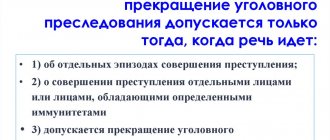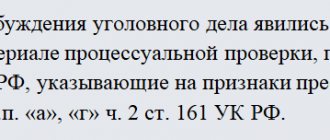1. A criminal case is terminated by a decision of the investigator, a copy of which is sent to the prosecutor.
2. The resolution shall indicate: 1) the date and place of its issuance; 2) position, surname, initials of the person who issued it; 3) the circumstances that served as the reason and basis for initiating a criminal case; 4) paragraph, part, article of the Criminal Code of the Russian Federation, providing for the crime on the basis of which a criminal case was initiated; 5) the results of the preliminary investigation indicating information about the persons against whom criminal prosecution was carried out; 6) the preventive measures used; 7) paragraph, part, article of this Code, on the basis of which the criminal case and (or) criminal prosecution are terminated; a decision to cancel the preventive measure, as well as the seizure of property, correspondence, temporary removal from office, control and recording of negotiations; 9) decision on material evidence; 10) the procedure for appealing this decision.
3. In cases where, in accordance with this Code, termination of a criminal case is allowed only with the consent of the accused or victim, the presence of such consent is reflected in the resolution.
4. The investigator shall hand over or send a copy of the resolution to terminate the criminal case to the person against whom the criminal prosecution has been terminated, the victim, the civil plaintiff and the civil defendant. In this case, the victim, the civil plaintiff, is explained the right to bring a claim in civil proceedings if the criminal case is terminated on the grounds provided for in paragraphs 2-6 of the first part of Article 24, Article 25, paragraphs 2-6 of the first part of Article 27 and Article 28 of this Code.
In criminal cases of crimes provided for in Articles 198-199.1 of the Criminal Code of the Russian Federation, the investigator sends a copy of the resolution to terminate the criminal case to the tax authority, which, in accordance with paragraph 3 of Article 32 of the Tax Code of the Russian Federation, sent materials for making a decision to initiate a criminal case.
5. If the grounds for termination of criminal prosecution do not apply to all suspects or accused in a criminal case, then the investigator, in accordance with Article 27 of this Code, makes a decision to terminate criminal prosecution against a specific person. However, the criminal proceedings continue.
How to draw up a resolution to terminate a criminal case in connection with the reconciliation of the parties
In the original version of the Code of Criminal Procedure of the Russian Federation, Chapter 57 was in force - a list of forms and procedural documents, including a form for a resolution to terminate a criminal case - 155.
Today, this chapter is no longer in force, but the forms themselves can be used - they overwhelmingly comply with the requirements of the current Code of Criminal Procedure.
You can find more complete information on the topic in ConsultantPlus. Free trial access to the system for 2 days.
So, the requirements for a decision to terminate a criminal case are set out in Art. 213 Code of Criminal Procedure of the Russian Federation.
Introductory part
Contains:
- name of the document (for example, “Resolution to terminate the criminal case in connection with the reconciliation of the parties”);
- date and place of delivery (the place is always assumed to be a specific locality);
- the position of the person who made the decision, his surname and initials (for example: investigator of the Investigative Directorate of the Ministry of Internal Affairs of Russia for the city of Kurgan V.I. Morozova).
Attention: in accordance with Art. 25 of the Code of Criminal Procedure of the Russian Federation, the investigator has the right to terminate a criminal case in connection with the reconciliation of the parties with the consent of the head of the investigative body, and the investigator - with the consent of the prosecutor. This agreement must be reflected in the resolution itself. Traditionally, it is placed in the upper right corner of the document.
The consent of the head of the investigative body or the prosecutor is also required in case of termination of the case for other reasons:
- in connection with active repentance (Article 28 of the Code of Criminal Procedure of the Russian Federation);
- in connection with compensation for damage to the budget of the Russian Federation (Article 28.1 of the Code of Criminal Procedure of the Russian Federation).
Descriptive part
Starts after the word “Install”. Here you should reflect:
- circumstances of the crime committed;
- the norm of the Criminal Code of the Russian Federation under which a criminal case was initiated (clause, part, article);
- the results of the investigation;
- information about the suspect (accused) in a criminal case;
- information about the preventive measure;
- the procedural basis for the termination of a criminal case, that is, the norms of the Criminal Code and the Criminal Procedure Code of the Russian Federation (in the case of termination of the case in connection with the reconciliation of the accused with the victim - Article 76 of the Criminal Procedure Code of the Russian Federation, Articles 25, 212, 213 of the Criminal Procedure Code of the Russian Federation).
Termination of a criminal investigation - what is it?
The concept of complete cessation of proceedings, according to the law, means the practiced form of complete closure of the development of a pre-organized investigation. According to modern criminal practice, this phenomenon is quite common.
There are several important signs that indicate the closure of a case:
- The process associated with the complete cessation of criminal cases is carried out exclusively by an official from beginning to end.
- Without completion of the criminal proceedings and investigation, the judicial process cannot begin.
- Each person who takes part in a criminal investigation has its own individual consequences.
- After the completion of any case, the maintenance of procedural documents completely ceases.
The person against whom the criminal case is terminated receives a corresponding notification from the official. This is a resolution on the official termination of the criminal case.
A resolution recording the termination of the investigation is drawn up and issued based on certain factors. First of all, these are real events preceding court proceedings. They must be provided for by the current provisions of constitutional rights.
In order to achieve an official termination of the case, all the accompanying circumstances under which the investigation began must be fully clarified.
The assessment must be carried out exclusively comprehensively and completely. In order for a criminal case to be dismissed before trial, the parties must have all the factual and formal legal grounds at their disposal.
Who can appeal the decision
Resolution to refuse to initiate a criminal case A decision to stop the process may be appealed. The Criminal Code of the Russian Federation does not establish a specific deadline for filing a complaint - it can be received either in a week or after several months (but no later than the expiration of the statute of limitations for the violation). The victim himself or other interested participants in the process have the right to appeal the decision.
Also read: How to write a report about phone theft
Reasons for appeal:
- new evidence and materials have appeared that are not in favor of the accused;
- insufficient investigation;
- lack of legal grounds for curtailing the process;
- incorrect conclusions of the investigator that led to the closure of the case;
- the injured party requires further investigation.
The complaint is sent to the court or prosecutor's office, where they are required to consider it within 3 days. If the prosecutor needs additional materials, he is given 10 days to make a decision. It can be positive or negative, in some cases the complaint is partially accepted. The prosecutor, after the specified period, must inform the applicant of the result, regardless of what verdict is rendered. The accused, his lawyer and other persons involved in this process are also notified.
The consideration of the complaint takes place in an open court session. The applicant or his legal representative, defense and other interested parties are present there. The failure of any participant to appear is not an obstacle to the meeting. If no violations are found during the proceedings, the termination of the case remains in force.
Attention! Only the prosecutor is authorized to cancel the decision.
If a decision is made to cancel the decision and resume the criminal case, the prosecutor must select an investigator who will subsequently lead the process. In addition to the injured party, the accused and his defense are informed about the continuation of the investigative process.
In Russia, the dismissal of a criminal case is a rare phenomenon. Investigators are primarily authorized to quash charges by closing the case. But they rarely do this on their own initiative, trying to complete the process and raise their rating, so they definitely need a good lawyer.
Lapse of time
The limitation periods are specified in the first part of Article 78 of the Criminal Code of the Russian Federation. At the same time, the termination of criminal prosecution and, as a consequence of this case, is regulated by the third paragraph of the first part of Article 24 of the Code of Criminal Procedure of the Russian Federation. According to this norm, a person is released from liability if certain periods have expired since the date of the crime:
- 2 years for minor crimes;
- 6 years for crimes of medium gravity;
- 10 years for serious crimes;
- 15 years for especially serious criminal acts.
According to Article 94 of the Criminal Code of the Russian Federation, for juvenile offenders the above terms are halved.
The expiration of deadlines is mandatory for officials, regardless of their conclusions and discretion. At the same time, in cases involving persons who have committed a crime punishable by death or life imprisonment, statutes of limitations do not apply during the preliminary investigation. The fact is that this action falls within the competence of the judicial authority. In addition, the Criminal Code of the Russian Federation specifies a number of crimes to which statutes of limitations do not apply. First of all, we are talking about crimes against peace and humanity.
Also read: Types of punishment for theft under Article 158 Part 3 of the Criminal Code of the Russian Federation
The limitation period is calculated from the moment the criminal act was committed. Of course, we are talking exclusively about those cases where the investigation either does not know the criminal or the fact that the crime was committed. If the perpetrator of a crime is hiding from justice, then the statute of limitations is not calculated.
According to the second part of Article 27 of the Code of Criminal Procedure of the Russian Federation, the accused has the right to object to the termination of the case due to the expiration of time limits. Such an action obliges the official to conduct proceedings in accordance with the general procedure. Such a provision allows a person who does not admit guilt in the act charged against him to achieve rehabilitation, in essence, to restore his good name.
Consequences of termination of the case
The issuance of a ruling affects all aspects of the process. This is most important for the life of the former suspect. This person receives the right to rehabilitation (if there are grounds). This consists of paying material compensation and organizing information support. The state is paying for the mistakes of investigators.
That is, a wrongfully accused person files a claim against the Ministry of Finance of the Russian Federation.
The list of rights of an innocent victim is given in Part 1 of Article 133 of the Code of Criminal Procedure. The former defendant may demand:
- Compensation for material damage resulting from loss of income (during arrest).
- Restoration of the right to reside in previously occupied premises if evicted due to criminal prosecution.
- Compensation for moral damage.
- Reinstatement to the previous place of duty.
- Resumption of pension accruals, if they were suspended.
Payments are made based on the relevant court decision. That is, a person who has suffered from arbitrariness/error of the investigation is obliged to file a claim with this authority. It is allowed to include the following proven material losses:
- Costs for the services of lawyers and other specialists.
- Unpaid benefits from the state due to criminal prosecution.
- Fines contributed to the budget in order to implement a canceled court decision.
- The value of the confiscated property.
- Expenses for restoring health, completing a rehabilitation course.
Each position of the claim must be supported by documents. The judge carefully examines the evidence. The decision is made in a balanced, fair and justified manner. In the absence of exonerating circumstances, the former suspect simply avoids responsibility. But the law gives a person the right to refuse to close a case. He is not required to state reasons. In such a situation, the investigation proceeds as usual.
Why you need to contact a lawyer
By law, the investigator must investigate the case impartially, objectively and professionally. But in practice everything is completely different.
The investigator needs to submit the criminal case to the court. And what “quality” it will be is the tenth question, because without a lawyer the court will side with the investigator.
Also read: Age of criminal responsibility in the Russian Federation: important features
The courts believe the testimony of the police officers themselves unconditionally. The testimony of these employees is called “operational information”, this is the disguise. It is assumed that “operational information” is objective, and a conviction can be based on it.
The court does not want to believe the testimony of defense witnesses. The court believes that they are biased, they are at one with the defendant, etc.
Witnesses? Investigators have “regular” witnesses at the ready who will sign and confirm anything in court. These may be cadets from departmental universities. Of course, they are on the side of the investigator, because they themselves are future investigators.
In cases, for example, about drugs, drug addicts themselves can be witnesses, who thus ensure that the investigator does not touch them for the time being. What kind of termination of a criminal case is there? This is “-1 case” in statistics for the investigator.
Without the help of a lawyer, the investigator will drag the case to trial, even if it becomes obvious that the suspect is innocent. But in court, maybe the case will somehow slip through... Could the judge be indignant and send the case for further investigation? Maybe, of course. If a judge is a conscientious and competent person, such people will meet. But it's better to be safe.
It is important to know: the investigator needs good statistics, so criminal cases are carried out even if they should be terminated. It reaches the point of absurdity. The court believes the investigator more and more willingly than the defendant: one government agency treats another government agency with understanding. And the investigator has more experience in legal matters than the one who got into trouble. What can you do without a professional lawyer whose services you can get? Just go to jail.
Important to know: remember that a lawyer is the only person involved in the case who wants to protect you and knows how to do it. A lawyer knows how to achieve a truly independent examination. How to attract witnesses and force the investigator to take their testimony into account. How to prove your alibi.
What to pay attention to
When drawing up a petition to terminate a criminal case, it is necessary to first determine what reasons the court may recognize as valid for granting the petition.
It is imperative to indicate in the final part that you are familiar with the consequences of termination of the case, and, moreover, to motivate your petition. After all, without the proper motivational part, such a request simply will not be approved.
At any stage of the trial, but before sentencing, a motion to dismiss the criminal case may be filed. To compile it, it is necessary to follow the structure and understand the Code of Criminal Procedure and the Criminal Code of the Russian Federation.
But if there really are grounds and the court does not see any pitfalls or dangers, then the petition will definitely be granted and the appropriate resolution will be issued.





